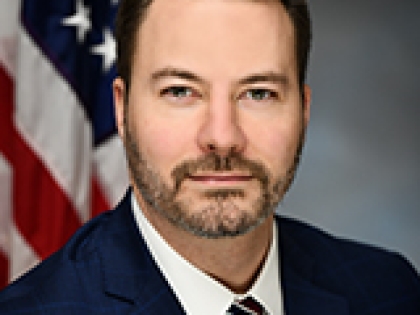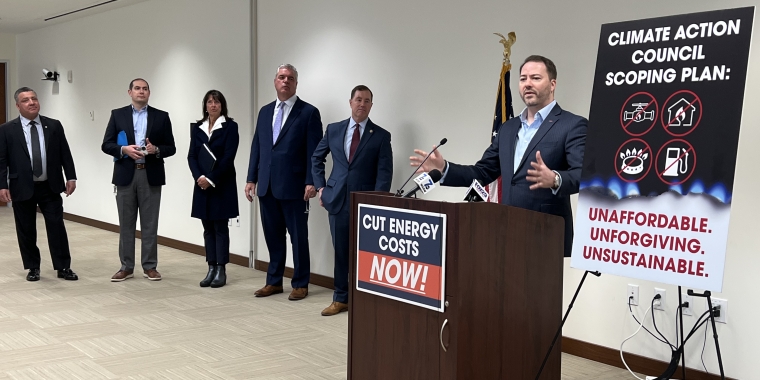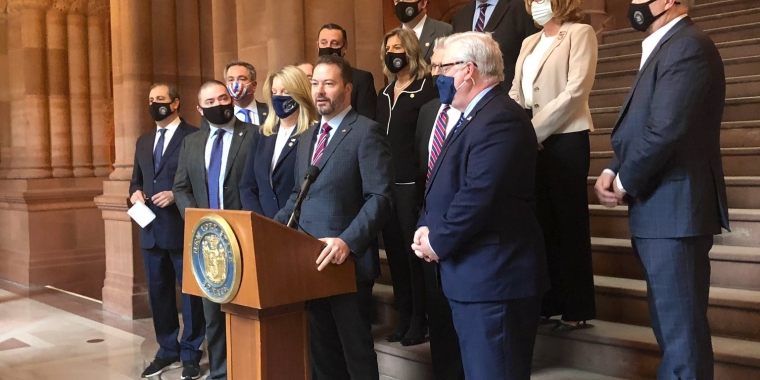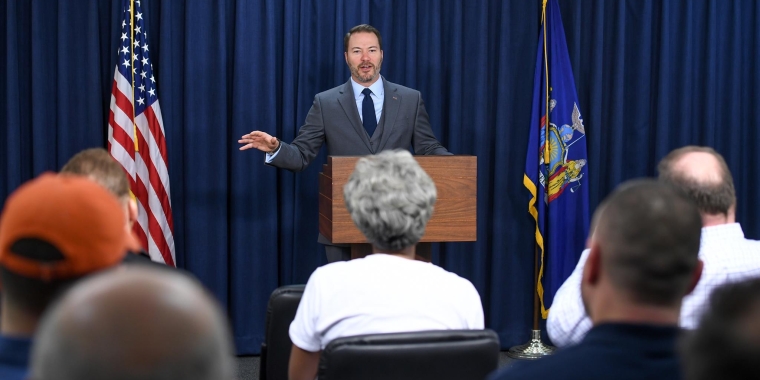
Senator Rob Ortt and Energy Stakeholders Urge Common Sense Climate Policies
April 27, 2022

BUFFALO, NY – State Senate Republican Leader Rob Ortt today stood with energy stakeholders to call for common sense climate policies in New York. In addition, with the deadline approaching, Senator Ortt repeated his call for New Yorkers to get involved and submit public comments on the Climate Action Council’s draft scoping plan by April 30, 2022.
The New York State Climate Action Council’s (CAC) draft Scoping Plan contains radical efforts to eliminate reliable, affordable sources of energy. Natural gas hookups and services, as well as those from propane and heating oil, are vital for New Yorkers – especially in rural communities and during harsh winters – and cutting off these dependable sources of energy would be costly to residents and businesses and ineffective on a global scale.
“The Climate Action Council has revealed their blueprint for completely altering the state’s energy plan and their out of touch proposal is beyond concerning. In a rushed fashion, their plans, which are absent of any definitive cost, will eventually put an end to gas services in buildings, natural gas appliances for home heating, cooking, water heating, and clothes drying, and gasoline-automobile sales – among many other absurd policies. It’s clear this scoping plan will increase the financial burden and hardship on everyday New Yorkers. Our fellow residents are experiencing an energy affordability crisis, surging inflation, rising home heating and electric bills, and severe pain at the pump. Now is not the time to completely rid the state of this dependable energy source,” said Senate Republican Leader Rob Ortt.
“We are all supportive of a clean and efficient energy future, but it is imperative that we do not jeopardize and overlook the importance of reliability and affordability as we look to achieve our climate goals. Until a reliable, dispatchable energy source is introduced, we simply cannot shy away from the use of gas. These policies show an extreme hyperbolic attitude by changing the verbiage of ‘natural gas’ to ‘fossil gas’ in an effort to scare the public. These rushed policies to rid the use of gas without a reliable alternative will further increase the financial burden on New York ratepayers. It is critical now that New Yorkers across the state get involved and comment on the Draft Scoping Plan so that climate policy recommendations can be made in a fair and balanced fashion. Everyday New Yorkers should not have to suffer hardships for rushed and out of touch policy that could deprive the state of dependable energy that keeps the lights on,” said Gavin Donohue, President and CEO, Independent Power Producers of New York.
“New York must reduce emissions and safeguard our environment while ensuring energy remains affordable and reliable for employers and ratepayers across the state. The current Climate Action Council scoping plan completely fails to strike this vital balance. Instead of addressing legitimate concerns about energy reliability and affordability, the plan will raise prices on all New Yorkers, make New York businesses less competitive, and exacerbate New York's nation-worst outmigration trend,” said Grant Loomis, Vice President of Government Affairs and Economic Development at Buffalo Niagara Partnership.
“The fact is, New York’s climate goals can be reached with a balanced approach that uses a mix of energy sources without banning reliable and affordable natural gas and abandoning the natural gas system altogether, as advocated by many of the Draft Scoping Plan’s proponents. By using an ‘all of the above’ approach – that is, renewables, greater energy efficiency and hybrid, dual energy heating systems, with the efficient use of the natural gas delivery system for low and no-carbon fuels – we can meet the state’s emissions targets without causing the disruptions in reliability and resiliency that would inevitably occur if we cutover to electric power alone. A one-size-fits-all approach proposed in the plan simply will not work for our portion of upstate New York, where an all-electric pathway would require a build-out of nearly four times the existing electric capacity. As well, the cost of transitioning would be far more burdensome on customers and where colder climates render all-electric systems less effective than in downstate New York,” said Donna L. DeCarolis, President of National Fuel Gas Distribution Corporation.
“The International Brotherhood of Electrical Workers recognizes and understands the scope of the CLCPA. We are committed to reaching the climate goals as defined in the CLCPA. But right now, we need a plan, not a ban. An important aspect we must focus on, is creating a sustainable, efficient, reliable and cost effective energy delivery system before we seek to eliminate the clean and reliable current energy sources. Energy consumers in New York must have access to clean, reliable, safe and cost efficient energy sources,” said Patrick Guidice, Business Manager, International Brotherhood of Electrical Workers 1049.
“Many of the recommendations that have been put forth by the Climate Action Council fail to consider the cost to New Yorkers. Environmental justice is an important issue, but driving state residents into energy poverty is not the answer. With inflation at its highest level since 1981 and prices at the pump skyrocketing, we must be careful not to burden people with additional costs at a time when people’s financial wellbeing is already being tested. Any plans to transition our state’s energy grid needs to include a full cost analysis and be done at a pace that residents can afford,” said Michelle Hook, Executive Director, New Yorkers for Affordable Energy,” said Michelle Hook, Executive Director, New Yorkers for Affordable Energy.
The CAC has released a blueprint to alter the state’s energy plans, which includes:
- No new gas service to existing buildings, beginning in 2024;
- No natural gas within newly constructed buildings, beginning in 2024;
- No new natural gas appliances for home heating, cooking, water heating, clothes drying beginning in 2030;
- No gasoline-automobile sales by 2035;
- Installing onsite solar or joining a community renewables program by 2040; and
- Installing geothermal heating by 2040.
New Yorkers have through June 10, 2022 to submit formal public comments on the proposed energy plan. Senator Ortt encourages hard-working residents and business owners to make their voices heard on these disastrous policies. New Yorkers can use this link to submit public comments: https://climate.ny.gov/Our-Climate-Act/Draft-Scoping-Plan.
In March, the Senate Republican Conference addressed the Energy Affordability Crisis and the urgent need for New Yorkers’ voices to be heard on Albany’s radical plans to increase energy costs in Albany.
“Before the state radically changes New Yorkers’ way of life and crushes their wallets, Albany Bureaucrats must listen to the experts who know the potential damage of these policies and everyday folks who don’t want to pay even more in energy bills,” concluded Leader Ortt.
Share this Article or Press Release
Newsroom
Go to Newsroom


